#data science course
Explore tagged Tumblr posts
Text
youtube
How To Learn Math for Machine Learning FAST (Even With Zero Math Background)
I dropped out of high school and managed to became an Applied Scientist at Amazon by self-learning math (and other ML skills). In this video I'll show you exactly how I did it, sharing the resources and study techniques that worked for me, along with practical advice on what math you actually need (and don't need) to break into machine learning and data science.
#How To Learn Math for Machine Learning#machine learning#free education#education#youtube#technology#educate yourselves#educate yourself#tips and tricks#software engineering#data science#artificial intelligence#data analytics#data science course#math#mathematics#Youtube
22 notes
·
View notes
Text
Unlocking the Power of Data: Essential Skills to Become a Data Scientist

In today's data-driven world, the demand for skilled data scientists is skyrocketing. These professionals are the key to transforming raw information into actionable insights, driving innovation and shaping business strategies. But what exactly does it take to become a data scientist? It's a multidisciplinary field, requiring a unique blend of technical prowess and analytical thinking. Let's break down the essential skills you'll need to embark on this exciting career path.
1. Strong Mathematical and Statistical Foundation:
At the heart of data science lies a deep understanding of mathematics and statistics. You'll need to grasp concepts like:
Linear Algebra and Calculus: Essential for understanding machine learning algorithms and optimizing models.
Probability and Statistics: Crucial for data analysis, hypothesis testing, and drawing meaningful conclusions from data.
2. Programming Proficiency (Python and/or R):
Data scientists are fluent in at least one, if not both, of the dominant programming languages in the field:
Python: Known for its readability and extensive libraries like Pandas, NumPy, Scikit-learn, and TensorFlow, making it ideal for data manipulation, analysis, and machine learning.
R: Specifically designed for statistical computing and graphics, R offers a rich ecosystem of packages for statistical modeling and visualization.
3. Data Wrangling and Preprocessing Skills:
Raw data is rarely clean and ready for analysis. A significant portion of a data scientist's time is spent on:
Data Cleaning: Handling missing values, outliers, and inconsistencies.
Data Transformation: Reshaping, merging, and aggregating data.
Feature Engineering: Creating new features from existing data to improve model performance.
4. Expertise in Databases and SQL:
Data often resides in databases. Proficiency in SQL (Structured Query Language) is essential for:
Extracting Data: Querying and retrieving data from various database systems.
Data Manipulation: Filtering, joining, and aggregating data within databases.
5. Machine Learning Mastery:
Machine learning is a core component of data science, enabling you to build models that learn from data and make predictions or classifications. Key areas include:
Supervised Learning: Regression, classification algorithms.
Unsupervised Learning: Clustering, dimensionality reduction.
Model Selection and Evaluation: Choosing the right algorithms and assessing their performance.
6. Data Visualization and Communication Skills:
Being able to effectively communicate your findings is just as important as the analysis itself. You'll need to:
Visualize Data: Create compelling charts and graphs to explore patterns and insights using libraries like Matplotlib, Seaborn (Python), or ggplot2 (R).
Tell Data Stories: Present your findings in a clear and concise manner that resonates with both technical and non-technical audiences.
7. Critical Thinking and Problem-Solving Abilities:
Data scientists are essentially problem solvers. You need to be able to:
Define Business Problems: Translate business challenges into data science questions.
Develop Analytical Frameworks: Structure your approach to solve complex problems.
Interpret Results: Draw meaningful conclusions and translate them into actionable recommendations.
8. Domain Knowledge (Optional but Highly Beneficial):
Having expertise in the specific industry or domain you're working in can give you a significant advantage. It helps you understand the context of the data and formulate more relevant questions.
9. Curiosity and a Growth Mindset:
The field of data science is constantly evolving. A genuine curiosity and a willingness to learn new technologies and techniques are crucial for long-term success.
10. Strong Communication and Collaboration Skills:
Data scientists often work in teams and need to collaborate effectively with engineers, business stakeholders, and other experts.
Kickstart Your Data Science Journey with Xaltius Academy's Data Science and AI Program:
Acquiring these skills can seem like a daunting task, but structured learning programs can provide a clear and effective path. Xaltius Academy's Data Science and AI Program is designed to equip you with the essential knowledge and practical experience to become a successful data scientist.
Key benefits of the program:
Comprehensive Curriculum: Covers all the core skills mentioned above, from foundational mathematics to advanced machine learning techniques.
Hands-on Projects: Provides practical experience working with real-world datasets and building a strong portfolio.
Expert Instructors: Learn from industry professionals with years of experience in data science and AI.
Career Support: Offers guidance and resources to help you launch your data science career.
Becoming a data scientist is a rewarding journey that blends technical expertise with analytical thinking. By focusing on developing these key skills and leveraging resources like Xaltius Academy's program, you can position yourself for a successful and impactful career in this in-demand field. The power of data is waiting to be unlocked – are you ready to take the challenge?
2 notes
·
View notes
Text
Types of Data Science | IABAC
Types of Data Science include descriptive analytics (analyzing past data), diagnostic analytics (identifying reasons for trends), predictive analysis (forecasting outcomes), and prescriptive analyses (recommending actions). It also covers machine learning, big data, NLP, computer vision, AI, and data engineering. https://iabac.org/
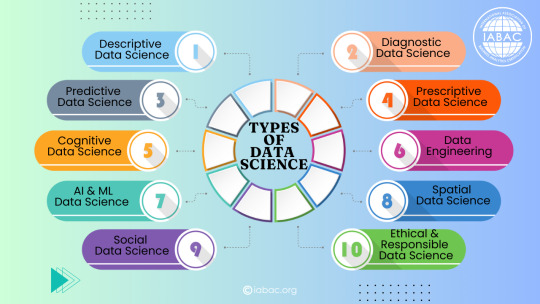
2 notes
·
View notes
Text
Why Tableau is Essential in Data Science: Transforming Raw Data into Insights

Data science is all about turning raw data into valuable insights. But numbers and statistics alone don’t tell the full story—they need to be visualized to make sense. That’s where Tableau comes in.
Tableau is a powerful tool that helps data scientists, analysts, and businesses see and understand data better. It simplifies complex datasets, making them interactive and easy to interpret. But with so many tools available, why is Tableau a must-have for data science? Let’s explore.
1. The Importance of Data Visualization in Data Science
Imagine you’re working with millions of data points from customer purchases, social media interactions, or financial transactions. Analyzing raw numbers manually would be overwhelming.
That’s why visualization is crucial in data science:
Identifies trends and patterns – Instead of sifting through spreadsheets, you can quickly spot trends in a visual format.
Makes complex data understandable – Graphs, heatmaps, and dashboards simplify the interpretation of large datasets.
Enhances decision-making – Stakeholders can easily grasp insights and make data-driven decisions faster.
Saves time and effort – Instead of writing lengthy reports, an interactive dashboard tells the story in seconds.
Without tools like Tableau, data science would be limited to experts who can code and run statistical models. With Tableau, insights become accessible to everyone—from data scientists to business executives.
2. Why Tableau Stands Out in Data Science
A. User-Friendly and Requires No Coding
One of the biggest advantages of Tableau is its drag-and-drop interface. Unlike Python or R, which require programming skills, Tableau allows users to create visualizations without writing a single line of code.
Even if you’re a beginner, you can:
✅ Upload data from multiple sources
✅ Create interactive dashboards in minutes
✅ Share insights with teams easily
This no-code approach makes Tableau ideal for both technical and non-technical professionals in data science.
B. Handles Large Datasets Efficiently
Data scientists often work with massive datasets—whether it’s financial transactions, customer behavior, or healthcare records. Traditional tools like Excel struggle with large volumes of data.
Tableau, on the other hand:
Can process millions of rows without slowing down
Optimizes performance using advanced data engine technology
Supports real-time data streaming for up-to-date analysis
This makes it a go-to tool for businesses that need fast, data-driven insights.
C. Connects with Multiple Data Sources
A major challenge in data science is bringing together data from different platforms. Tableau seamlessly integrates with a variety of sources, including:
Databases: MySQL, PostgreSQL, Microsoft SQL Server
Cloud platforms: AWS, Google BigQuery, Snowflake
Spreadsheets and APIs: Excel, Google Sheets, web-based data sources
This flexibility allows data scientists to combine datasets from multiple sources without needing complex SQL queries or scripts.
D. Real-Time Data Analysis
Industries like finance, healthcare, and e-commerce rely on real-time data to make quick decisions. Tableau’s live data connection allows users to:
Track stock market trends as they happen
Monitor website traffic and customer interactions in real time
Detect fraudulent transactions instantly
Instead of waiting for reports to be generated manually, Tableau delivers insights as events unfold.
E. Advanced Analytics Without Complexity
While Tableau is known for its visualizations, it also supports advanced analytics. You can:
Forecast trends based on historical data
Perform clustering and segmentation to identify patterns
Integrate with Python and R for machine learning and predictive modeling
This means data scientists can combine deep analytics with intuitive visualization, making Tableau a versatile tool.
3. How Tableau Helps Data Scientists in Real Life
Tableau has been adopted by the majority of industries to make data science more impactful and accessible. This is applied in the following real-life scenarios:
A. Analytics for Health Care
Tableau is deployed by hospitals and research institutions for the following purposes:
Monitor patient recovery rates and predict outbreaks of diseases
Analyze hospital occupancy and resource allocation
Identify trends in patient demographics and treatment results
B. Finance and Banking
Banks and investment firms rely on Tableau for the following purposes:
✅ Detect fraud by analyzing transaction patterns
✅ Track stock market fluctuations and make informed investment decisions
✅ Assess credit risk and loan performance
C. Marketing and Customer Insights
Companies use Tableau to:
✅ Track customer buying behavior and personalize recommendations
✅ Analyze social media engagement and campaign effectiveness
✅ Optimize ad spend by identifying high-performing channels
D. Retail and Supply Chain Management
Retailers leverage Tableau to:
✅ Forecast product demand and adjust inventory levels
✅ Identify regional sales trends and adjust marketing strategies
✅ Optimize supply chain logistics and reduce delivery delays
These applications show why Tableau is a must-have for data-driven decision-making.
4. Tableau vs. Other Data Visualization Tools
There are many visualization tools available, but Tableau consistently ranks as one of the best. Here’s why:
Tableau vs. Excel – Excel struggles with big data and lacks interactivity; Tableau handles large datasets effortlessly.
Tableau vs. Power BI – Power BI is great for Microsoft users, but Tableau offers more flexibility across different data sources.
Tableau vs. Python (Matplotlib, Seaborn) – Python libraries require coding skills, while Tableau simplifies visualization for all users.
This makes Tableau the go-to tool for both beginners and experienced professionals in data science.
5. Conclusion
Tableau has become an essential tool in data science because it simplifies data visualization, handles large datasets, and integrates seamlessly with various data sources. It enables professionals to analyze, interpret, and present data interactively, making insights accessible to everyone—from data scientists to business leaders.
If you’re looking to build a strong foundation in data science, learning Tableau is a smart career move. Many data science courses now include Tableau as a key skill, as companies increasingly demand professionals who can transform raw data into meaningful insights.
In a world where data is the driving force behind decision-making, Tableau ensures that the insights you uncover are not just accurate—but also clear, impactful, and easy to act upon.
#data science course#top data science course online#top data science institute online#artificial intelligence course#deepseek#tableau
3 notes
·
View notes
Text
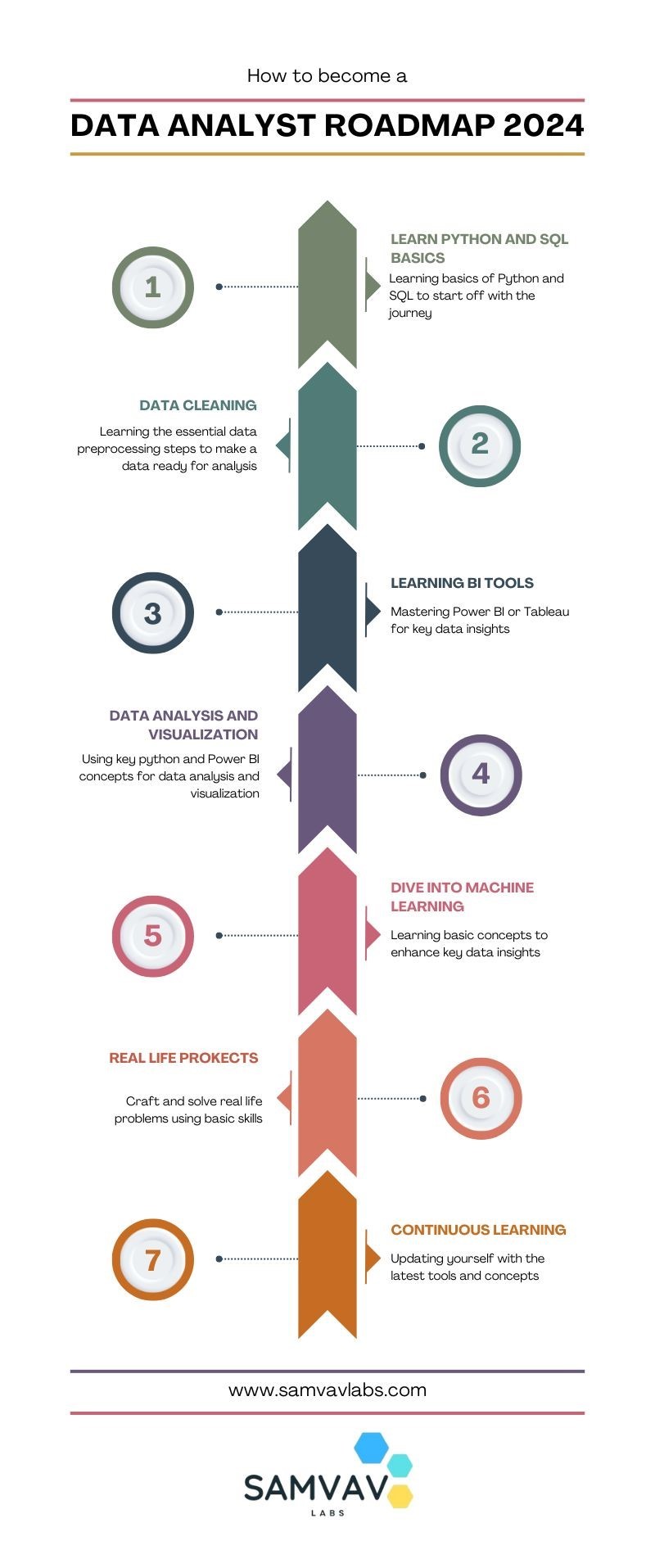
Data Analyst Roadmap for 2024!
Cracking the Data Analyst Roadmap for 2024! Kick off your journey by mastering and delving into Python for data manipulation magic, and dazzle stakeholders with insights using PowerBi or Tableau. Don't forget, that SQL proficiency and hands-on projects refine your skillset, but never overlook the importance of effective communication and problem-solving. Are you checking off these milestones on your path to success? 📌 For more details, visit our website: https://www.samvavlabs.com . . . #DataAnalyst2024 #CareerGrowth #roadmap #DataAnalyst #samvavlabs #roadmap2024 #dataanalystroadmap #datavisualization
#business analytics#data analytics#data analyst#machinelearning#data visualization#datascience#deep learning#data analyst training#dataanalystcourseinKolkata#data analyst certification#data analyst course#data science course#business analyst
9 notes
·
View notes
Text
What are some challenging concepts for beginners learning data science, such as statistics and machine learning?
Hi,
For beginners in data science, several concepts can be challenging due to their complexity and depth.
Here are some of the most common challenging concepts in statistics and machine learning:

Statistics:
Probability Distributions: Understanding different probability distributions (e.g., normal, binomial, Poisson) and their properties can be difficult. Knowing when and how to apply each distribution requires a deep understanding of their characteristics and applications.
Hypothesis Testing: Hypothesis testing involves formulating null and alternative hypotheses, selecting appropriate tests (e.g., t-tests, chi-square tests), and interpreting p-values. The concepts of statistical significance and Type I/Type II errors can be complex and require careful consideration.
Confidence Intervals: Calculating and interpreting confidence intervals for estimates involves understanding the trade-offs between precision and reliability. Beginners often struggle with the concept of confidence intervals and their implications for statistical inference.
Regression Analysis: Multiple regression analysis, including understanding coefficients, multicollinearity, and model assumptions, can be challenging. Interpreting regression results and diagnosing issues such as heteroscedasticity and autocorrelation require a solid grasp of statistical principles.
Machine Learning:
Bias-Variance Tradeoff: Balancing bias and variance to achieve a model that generalizes well to new data can be challenging. Understanding overfitting and underfitting, and how to use techniques like cross-validation to address these issues, requires careful analysis.
Feature Selection and Engineering: Selecting the most relevant features and engineering new ones can significantly impact model performance. Beginners often find it challenging to determine which features are important and how to transform raw data into useful features.
Algorithm Selection and Tuning: Choosing the appropriate machine learning algorithm for a given problem and tuning its hyperparameters can be complex. Each algorithm has its own strengths, limitations, and parameters that need to be optimized.
Model Evaluation Metrics: Understanding and selecting the right evaluation metrics (e.g., accuracy, precision, recall, F1 score) for different types of models and problems can be challenging.
Advanced Topics:
Deep Learning: Concepts such as neural networks, activation functions, backpropagation, and hyperparameter tuning in deep learning can be intricate. Understanding how deep learning models work and how to optimize them requires a solid foundation in both theoretical and practical aspects.
Dimensionality Reduction: Techniques like Principal Component Analysis (PCA) and t-Distributed Stochastic Neighbor Embedding (t-SNE) for reducing the number of features while retaining essential information can be difficult to grasp and apply effectively.
To overcome these challenges, beginners should focus on building a strong foundation in fundamental concepts through practical exercises, online courses, and hands-on projects. Seeking clarification from mentors or peers and engaging in data science communities can also provide valuable support and insights.
#bootcamp#data science course#datascience#data analytics#machinelearning#big data#ai#data privacy#python
3 notes
·
View notes
Text
From Zero to Hero: Grow Your Data Science Skills
Understanding the Foundations of Data Science
We produce around 2.5 quintillion bytes of data worldwide, which is enough to fill 10 million DVDs! That huge amount of data is more like a goldmine for data scientists, they use different tools and complex algorithms to find valuable insights.
Here's the deal: data science is all about finding valuable insights from the raw data. It's more like playing a jigsaw puzzle with a thousand parts and figuring out how they all go together. Begin with the basics, Learn how to gather, clean, analyze, and present data in a straightforward and easy-to-understand way.
Here Are The Skill Needed For A Data Scientists
Okay, let’s talk about the skills you’ll need to be a pro in data science. First up: programming. Python is your new best friend, it is powerful and surprisingly easy to learn. By using the libraries like Pandas and NumPy, you can manage the data like a pro.
Statistics is another tool you must have a good knowledge of, as a toolkit that will help you make sense of all the numbers and patterns you deal with. Next is machine learning, and here you train the data model by using a huge amount of data and make predictions out of it.
Once you analyze and have insights from the data, and next is to share this valuable information with others by creating simple and interactive data visualizations by using charts and graphs.
The Programming Language Every Data Scientist Must Know
Python is the language every data scientist must know, but there are some other languages also that are worth your time. R is another language known for its statistical solid power if you are going to deal with more numbers and data, then R might be the best tool for you.
SQL is one of the essential tools, it is the language that is used for managing the database, and if you know how to query the database effectively, then it will make your data capturing and processing very easy.
Exploring Data Science Tools and Technologies
Alright, so you’ve got your programming languages down. Now, let’s talk about tools. Jupyter Notebooks are fantastic for writing and sharing your code. They let you combine code, visualizations, and explanations in one place, making it easier to document your work and collaborate with others.
To create a meaningful dashboard Tableau is the tool most commonly used by data scientists. It is a tool that can create interactive dashboards and visualizations that will help you share valuable insights with people who do not have an excellent technical background.
Building a Strong Mathematical Foundation
Math might not be everyone’s favorite subject, but it’s a crucial part of data science. You’ll need a good grasp of statistics for analyzing data and drawing conclusions. Linear algebra is important for understanding how the algorithms work, specifically in machine learning. Calculus helps optimize algorithms, while probability theory lets you handle uncertainty in your data. You need to create a mathematical model that helps you represent and analyze real-world problems. So it is essential to sharpen your mathematical skills which will give you a solid upper hand in dealing with complex data science challenges.
Do Not Forget the Data Cleaning and Processing Skills
Before you can dive into analysis, you need to clean the data and preprocess the data. This step can feel like a bit of a grind, but it’s essential. You’ll deal with missing data and decide whether to fill in the gaps or remove them. Data transformation normalizing and standardizing the data to maintain consistency in the data sets. Feature engineering is all about creating a new feature from the existing data to improve the models. Knowing this data processing technique will help you perform a successful analysis and gain better insights.
Diving into Machine Learning and AI
Machine learning and AI are where the magic happens. Supervised learning involves training models using labeled data to predict the outcomes. On the other hand, unsupervised learning assists in identifying patterns in data without using predetermined labels. Deep learning comes into play when dealing with complicated patterns and producing correct predictions, which employs neural networks. Learn how to use AI in data science to do tasks more efficiently.
How Data Science Helps To Solve The Real-world Problems
Knowing the theory is great, but applying what you’ve learned to real-world problems is where you see the impact. Participate in data science projects to gain practical exposure and create a good portfolio. Look into case studies to see how others have tackled similar issues. Explore how data science is used in various industries from healthcare to finance—and apply your skills to solve real-world challenges.
Always Follow Data Science Ethics and Privacy
Handling data responsibly is a big part of being a data scientist. Understanding the ethical practices and privacy concerns associated with your work is crucial. Data privacy regulations, such as GDPR, set guidelines for collecting and using data. Responsible AI practices ensure that your models are fair and unbiased. Being transparent about your methods and accountable for your results helps build trust and credibility. These ethical standards will help you maintain integrity in your data science practice.
Building Your Data Science Portfolio and Career
Let’s talk about careers. Building a solid portfolio is important for showcasing your skills and projects. Include a variety of projects that showcase your skills to tackle real-world problems. The data science job market is competitive, so make sure your portfolio is unique. Earning certifications can also boost your profile and show your dedication in this field. Networking with other data professionals through events, forums, and social media can be incredibly valuable. When you are facing job interviews, preparation is critical. Practice commonly asked questions to showcase your expertise effectively.
To Sum-up
Now you have a helpful guideline to begin your journey in data science. Always keep yourself updated in this field to stand out if you are just starting or want to improve. Check this blog to find the best data science course in Kolkata. You are good to go on this excellent career if you build a solid foundation to improve your skills and apply what you have learned in real life.
2 notes
·
View notes
Text
Full Stack Developer vs. Front End Developer vs. Back End Developer
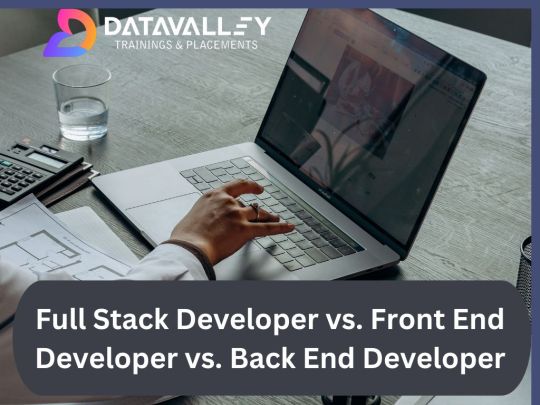
The role of a web developer is always included in the lists of high-paying IT jobs. This is because web developers are essential in today’s digital world. They create amazing websites, high-performing e-commerce sites, and other web-based applications. If you want to be a web developer, you must understand that full-stack developer skills are in great demand. However, do you understand the differences between full-stack, front-end, and back-end web development? In this post, we’ll see the differences between these three job roles, skills, and salaries.
What is Web Development?
The process of developing a website on the internet is known as web development. The non-design components of a website, such as building features and functioning with programming, markup, and scripting languages, are referred to as web development. Developers focus on technical aspects of website development such as architecture, programming, and application integration, as well as visuals.
A web developer is someone who does the following:
Creates and maintains webpages and other web-based applications.
Creates a website from a web design.
They collaborate with clients, stakeholders, and designers to understand the concept.
Can focus on frontend or backend development. Even as a full-stack developer, if necessary.
Types of Web Development
Front End Development: This aspect of web development focuses on what the user interacts with directly, i.e., the user interface of a website or web application. Front-end development deals with the design, layout, and interactivity of a site, ensuring that it’s visually appealing and user-friendly.
Back End Development: The back end is the part of a website or application that operates behind the scenes. It manages data, user authentication, and the server-side logic, ensuring the smooth functioning of the website.
Now, let’s delve into each of these roles in detail.
What is front-end development?
Front-end development, often referred to as client-side development, is the process of creating the visual elements of a website or web application that users interact with directly. It involves writing code for the user interface, optimizing website performance, and ensuring the site looks and functions correctly on various devices and browsers.
Who is a front-end developer?
A front-end developer, also known as a client-side developer, is responsible for turning web designs into a functioning website or application. They work closely with web designers and back-end developers to create an engaging and responsive user experience.
What are the front-end developer’s skills?
Front-end developers should be proficient in the following skills:
Mastery of HTML (Hypertext Markup Language) and CSS (Cascading Style Sheets) is fundamental for structuring and styling web pages.
Proficiency in JavaScript is crucial for adding interactivity and dynamic features to a website.
Knowledge of front-end frameworks like React, Angular, or Vue.js, which simplify and expedite development.
The ability to create websites that look and function well on various devices and screen sizes.
Ensuring that the website performs consistently across different browsers.
Familiarity with version control systems like Git for code management and collaboration.
Front End Developer Salary
The salary of a front-end developer can vary based on factors such as experience, location, and the company. On average, junior front-end developers can earn between $50,000 and $70,000 annually, while senior front-end developers can command salaries ranging from $90,000 to $120,000 or more.
What is Back End Development?
Back-end development, often referred to as server-side development, focuses on the server and database sides of a website or web application. It involves building and maintaining the server, databases, and applications that enable the front end to function correctly.
Who is a Back End Developer?
A back-end developer is responsible for managing the server, databases, and server-side logic of a website or application. They ensure that data is stored securely, accessed efficiently, and transmitted effectively between the front end and back end.
What are Back End Developer Skills?
Back-end developers should have expertise in the following areas:
Server-Side Programming Languages: Proficiency in languages such as Python, Ruby, Node.js, PHP, or Java is used to build server-side applications.
Databases: Knowledge of database management systems like MySQL, PostgreSQL, MongoDB, and NoSQL databases.
APIs: The ability to create and manage APIs (Application Programming Interfaces) for communication between the front end and back end.
Server Management: Skills in managing web servers and server infrastructure.
Security: Understanding web security practices and techniques to protect user data.
Version Control/Git: Proficiency in version control systems to manage and collaborate on code.
Back End Developer Salary
Back-end developer salaries can also vary based on experience, location, and the organization. Junior back-end developers can earn an annual salary ranging from $60,000 to $90,000, while senior back-end developers can expect salaries ranging from $100,000 to $150,000 or more.
Frontend vs. Backend Development
Front-end and back-end development are two halves of a whole, and they must work together seamlessly to create a functional website or application. While front-end developers focus on user interface and design, back-end developers deal with the underlying server infrastructure and data management. Both roles are essential for a successful web project.
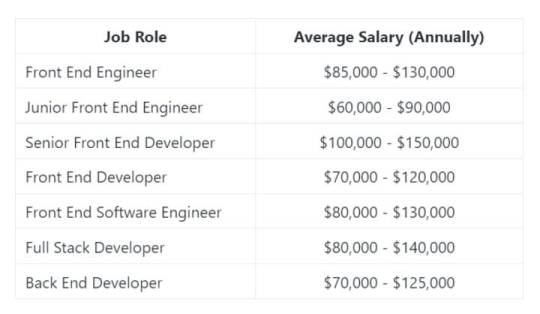
What is a Full Stack Developer?
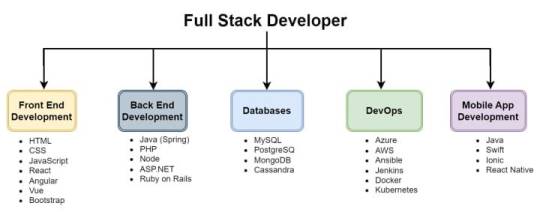
Who is a Full Stack Developer?
A full stack developer is a well-rounded professional who can take care of every aspect of web development, from designing the user interface to managing databases and server-side logic. They bridge the gap between front end and back-end development, ensuring that the entire application functions cohesively.
What are the Full Stack Developer Skills?
Full stack developers need a broad range of skills, including:
HTML/CSS: Proficiency in front end technologies for web page structuring and styling.
JavaScript: Mastery of JavaScript for creating dynamic and interactive web elements.
Front End Frameworks: Knowledge of front-end frameworks for efficient development.
Server-Side Programming Languages: Expertise in languages like Node.js, Python, Ruby, or Java for server-side development.
Databases: Proficiency in database management systems for data storage and retrieval.
APIs: Ability to create and manage APIs for communication between the front end and back end.
Version Control/Git: Familiarity with version control systems for code management.
Problem-Solving: Strong analytical and problem-solving skills to troubleshoot and optimize web applications.
Full Stack Developer Salary
Full-stack web developers are in high demand due to their range of skills and extensive knowledge. An average full stack developer’s annual salary might range from $110,000 to $150,000, based on their skill set and expertise.
Full-stack engineers earn more money than front end or back end developers. Employers agree to pay more for a full stack developer since it makes more business sense to hire one person with front and back end expertise rather than two.
As a result, the profession of a full stack developer is a profitable alternative for aspirants looking to create a career in the digital business.
The choice between becoming a full stack developer, front end developer, or back end developer depends on your interests, strengths, and career goals. Front end developers excel at creating visually appealing and user-friendly interfaces; back end developers focus on the server-side and data management; and full stack developers possess a comprehensive skill set that allows them to manage the entire development process. Each role is integral to the web development ecosystem, and the right one for you depends on your passions and aspirations within the field.
If you’re considering the path of a full stack developer and are eager to acquire the comprehensive skill set required to excel in this role, we have an excellent suggestion for you. Consider enrolling in the Full Stack Developer course at Datavalley.
Datavalley has a stellar track record of empowering aspiring developers with the knowledge and expertise to succeed in the dynamic world of web development. Their course covers everything from the fundamentals of HTML and CSS to in-depth training in JavaScript, front end and back end frameworks, and much more.
By joining Datavalley’s Full Stack Developer course, you’ll gain hands-on experience, build an impressive portfolio, and be well-prepared for a rewarding career in web development.
Don’t miss out on this opportunity to kickstart your journey as a Full Stack Developer with Datavalley. Your future in web development awaits. Take the first step today!
Attend Free Bootcamp at Datavalley
If you’re looking to supercharge your Java development skills and become a full-stack Java developer, consider joining the Java Full Stack Developer bootcamp at Datavalley. It’s an excellent opportunity to enhance your expertise and take your career to the next level.
Key points about Bootcamps:
It is completely free, and there is no obligation to complete the entire course.
20 hours total, two hours daily for two weeks.
Gain hands-on experience with tools and projects.
Explore and decide if the field or career is right for you.
Complete a mini project.
Earn a certificate to show on your profile.
No commitment is required after bootcamp.
Take another bootcamp if you are unsure about your track.
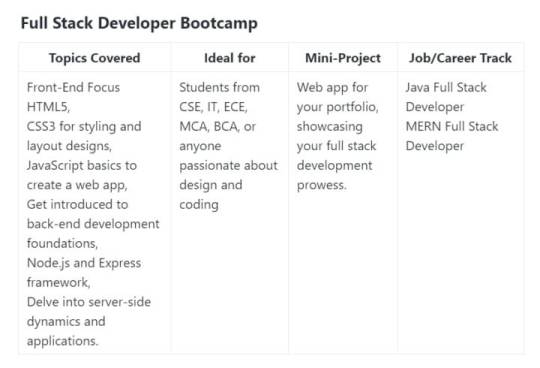
#datavalley#dataexperts#data engineering#data analytics#dataexcellence#business intelligence#data science#power bi#data analytics course#data science course#full stack course#full stack training#full stack web development#full stack developer#full stack software developer#front end developers#back end development
7 notes
·
View notes
Text
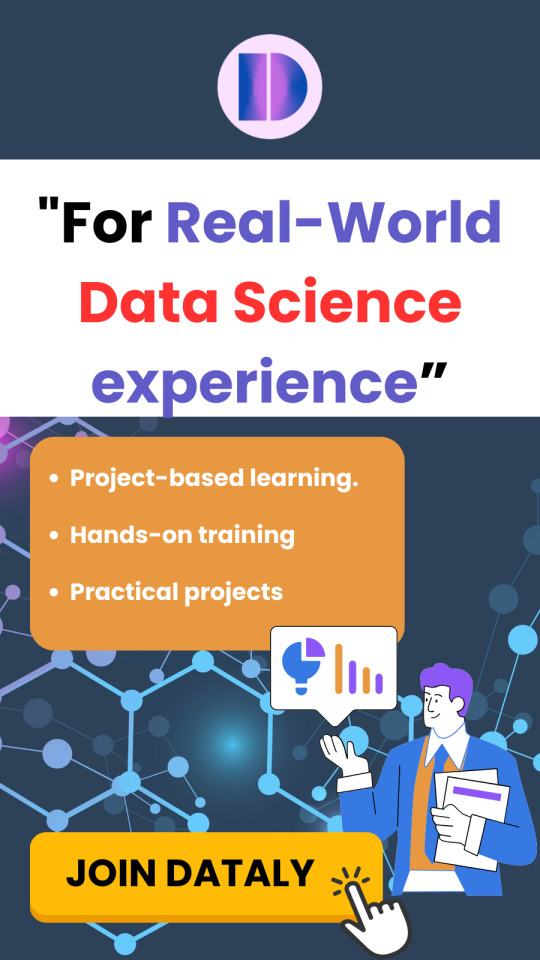
#data science course#data science training#data science certification#data science online course#data science institute in delhi#data scientist#data analytics#big data#machine learning#business intelligence#data science in canada
2 notes
·
View notes
Text
youtube
All About Data Science and Analytics Course by Imarticus Leaning | Data Science For Beginners
Looking to supercharge your career in Data Science and Analytics? Look no further! Explore the comprehensive Imarticus Postgraduate Program in Data Science & Analytics.
#Data Science and Analytics Course#Data Science#data analytics#data analyst course#data analyst training#Imarticus#data science course#Youtube
3 notes
·
View notes
Text
youtube
Statistics - A Full Lecture to learn Data Science (2025 Version)
Welcome to our comprehensive and free statistics tutorial (Full Lecture)! In this video, we'll explore essential tools and techniques that power data science and data analytics, helping us interpret data effectively. You'll gain a solid foundation in key statistical concepts and learn how to apply powerful statistical tests widely used in modern research and industry. From descriptive statistics to regression analysis and beyond, we'll guide you through each method's role in data-driven decision-making. Whether you're diving into machine learning, business intelligence, or academic research, this tutorial will equip you with the skills to analyze and interpret data with confidence. Let's get started!
#education#free education#technology#educate yourselves#educate yourself#data analysis#data science course#data science#data structure and algorithms#youtube#statistics for data science#statistics#economics#education system#learn data science#learn data analytics#Youtube
3 notes
·
View notes
Text
Business Analytics vs. Data Science: Understanding the Key Differences

In today's data-driven world, terms like "business analytics" and "data science" are often used interchangeably. However, while they share a common goal of extracting insights from data, they are distinct fields with different focuses and methodologies. Let's break down the key differences to help you understand which path might be right for you.
Business Analytics: Focusing on the Present and Past
Business analytics primarily focuses on analyzing historical data to understand past performance and inform current business decisions. It aims to answer questions like:
What happened?
Why did it happen?
What is happening now?
Key characteristics of business analytics:
Descriptive and Diagnostic: It uses techniques like reporting, dashboards, and data visualization to summarize and explain past trends.
Structured Data: It often works with structured data from databases and spreadsheets.
Business Domain Expertise: A strong understanding of the specific business domain is crucial.
Tools: Business analysts typically use tools like Excel, SQL, Tableau, and Power BI.
Focus: Optimizing current business operations and improving efficiency.
Data Science: Predicting the Future and Building Models
Data science, on the other hand, focuses on building predictive models and developing algorithms to forecast future outcomes. It aims to answer questions like:
What will happen?
How can we make it happen?
Key characteristics of data science:
Predictive and Prescriptive: It uses machine learning, statistical modeling, and AI to predict future trends and prescribe optimal actions.
Unstructured and Structured Data: It can handle both structured and unstructured data from various sources.
Technical Proficiency: Strong programming skills (Python, R) and a deep understanding of machine learning algorithms are essential.
Tools: Data scientists use programming languages, machine learning libraries, and big data technologies.
Focus: Developing innovative solutions, building AI-powered products, and driving long-term strategic initiatives.
Key Differences Summarized:

Which Path is Right for You?
Choose Business Analytics if:
You are interested in analyzing past data to improve current business operations.
You have a strong understanding of a specific business domain.
You prefer working with structured data and using visualization tools.
Choose Data Science if:
You are passionate about building predictive models and developing AI-powered solutions.
You have a strong interest in programming and machine learning.
You enjoy working with both structured and unstructured data.
Xaltius Academy's Data Science & AI Course:
If you're leaning towards data science and want to delve into machine learning and AI, Xaltius Academy's Data Science & AI course is an excellent choice. This program equips you with the necessary skills and knowledge to become a proficient data scientist, covering essential topics like:
Python programming
Machine learning algorithms
Data visualization
And much more!
By understanding the distinct roles of business analytics and data science, you can make an informed decision about your career path and leverage the power of data to drive success.
2 notes
·
View notes
Text
🚀 Is “Internet Academy” the Right EdTech Choice for You? Hear It from Rahul!
We LOVE it when our users take a moment to share their learning journey! 💬
Recently, Rahul Gupta visited our platform — AnalyticsJobs.in — and dropped a detailed review of the Internet Academy Data Course. 📚✨
He spoke about the course structure, fee, learning experience, and career impact — basically, everything you’d want to know before enrolling.
👉 Thinking about joining Internet Academy? Why not learn from real student experiences first?
📌 Check out Rahul's review and see what others are saying: 🔗 https://analyticsjobs.in/question/internet-academy-reviews-careers-courses-learning-mode-fee-reviews-ratings-and-feedback/
💭 Already taken this course? We’d love to hear your thoughts too! Your feedback helps thousands of learners make smarter choices.
#StudentVoices #AnalyticsJobs #EdTechIndia #DataScienceCourses #CourseReview #InternetAcademy #LearningWithPurpose #StudentFeedback #CareerInDataScience #EdTechReview

0 notes
Text
Is it possible to transition to a data scientist from a non-tech background at the age of 28?
Hi,
You can certainly shift to become a data scientist from a nontechnical background at 28. As a matter of fact, very many do. Most data scientists have actually shifted to this field from different academic and professional backgrounds, with some of them having changed careers even in their midlife years.

Build a Strong Foundation:
Devour some of the core knowledge about statistics, programming, and data analysis. Online classes, bootcamps—those are good and many, many convenient resources. Give it a whirl with Coursera and Lejhro for specific courses related to data science, machine learning and programming languages like Python and R.
A data scientist needs to be proficient in at least one or two programming languages. Python is the most used language for data science, for it is simple, and it has many libraries. R is another language that might come in handy for a data scientist, mostly in cases connected with statistical analysis. The study of manipulation libraries for study data and visualization tools includes Pandas for Python and Matplotlib and Seaborn for data, respectively.
Develop Analytical Skills:
The field of data science includes much analytics and statistics. Probability, hypothesis testing, regression analysis would be essential. These skills will help you derive meaningful information out of the data and also allow you to use statistical methods for real-world problems.
Practical experience is very important in the field of data science. In order to gain experience, one might work on personal projects or contribute to open-source projects in the same field. For instance, data analysis on publicly available datasets, machine learning, and creating models to solve particular problems, all these steps help to make the field more aware of skills with one's profile.
Though formal education in data science is by no means a requirement, earning a degree or certification in the discipline you are considering gives you great credibility. Many reputed universities and institutions offer courses on data science, machine learning, and analytics.
Connect with professionals in the same field: try to be part of communities around data science and attend events as well. You would be able to find these opportunities through networking and mentoring on platforms like LinkedIn, Kaggle, and local meetups. This will keep you abreast of the latest developments in this exciting area of research and help you land job opportunities while getting support.
Look out for entry-level job opportunities or internships in the field of data science; this, in effect, would be a great way to exercise your acquired experience so far. Such positions will easily expose one to a real-world problem related to data and allow seizing the occasion to develop practical skills. These might be entry-level positions, such as data analysts or junior data scientists, to begin with.
Stay Current with Industry Trends: Data science keeps on evolving with new techniques, tools, and technologies. Keep up to date with the latest trends and developments in the industry by reading blogs and research papers online and through courses.
Conclusion:
It is definitely possible to move into a data scientist role if one belongs to a non-tech profile and is eyeing this target at the age of 28. Proper approach in building the base of strong, relevant skills, gaining practical experience, and networking with industry professionals helps a lot in being successful in the transition. This is because data science as a field is more about skills and the ability to solve problems, which opens its doors to people from different backgrounds.
#bootcamp#data science course#datascience#python#big data#machinelearning#data analytics#ai#data privacy
3 notes
·
View notes
Text
Master Big Data in Kochi: Transform Data into Real-Time Insights
Step into the future of data-driven decision making with our comprehensive Big Data course in Kochi. Designed for aspiring data professionals and tech enthusiasts, this program covers the full spectrum—from Hadoop and Spark to data lakes, real-time analytics, and machine learning integration. Learn to handle massive datasets, optimize storage, and extract actionable insights that drive business success.
Get hands-on training with real-world projects, industry-grade tools, and practical challenges that simulate the data environments of leading companies. Whether you're a fresher or a working professional looking to upgrade your skills, this course equips you with everything needed to thrive in a rapidly evolving data landscape.
Conclusion:This immersive learning experience is brought to you by Zoople Technologies, one of Kochi’s most trusted tech institutes, known for its expert faculty, personalized mentorship, and 100% placement assistance.
0 notes